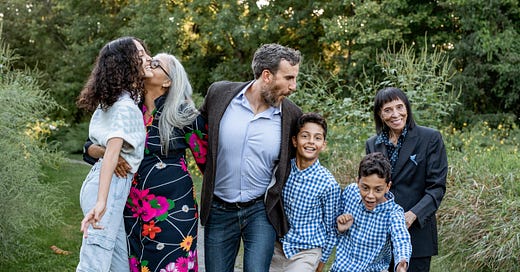
I still remember the night of the election. My wife, Sonya, and I were so happy that we left the apartment and hopped in the car, just to see if the rest of the neighborhood felt as we did.
A black man, with a name as foreign as Barack Hussein Obama, was now the president-elect. People were everywhere. In Jamaica Plain, our neighborhood in Boston, we saw them laughing and hugging and taking their pints from the bars where they’d watched the results out into the chilly November night in 2008 just to dance on the sidewalk.
I rolled down the window and shouted, “Woohoo!”
Here was progress, at last, and not just for America, but for the kids Sonya and I hoped to have.
“Can you imagine it?” I said. “A president like them.”
There were not a lot of interracial couples in those years, and even fewer from backgrounds as disparate as ours: Sonya, the black woman from inner-city Houston; me, the white guy from an Iowa farm. Like our future children, Barack Obama was the child of vastly different experiences—a Kenyan father and a white mother born in Kansas. I told Sonya that night that our kids will see Barack Obama and grow up with a cultural worldview similar to his own.
We held hands at the promise of it all. America, progressing.
I remember the summer of 2020, too. By then, our daughter, Harper, was 11, and our twin boys, Marshall and Walker, were nine, and we didn’t know what to make of America’s progress.
It had started to harden into something ugly. Progressivism had abandoned its open-mindedness and color blindness and insisted on the unavoidability—the supremacy—of color. According to the new dogma, only black people could understand black people.
The black NYU students who demanded they be housed in segregated dorms. The POC Berkeley students whose off-campus housing barred white people from entering. The Boston University professor and best-selling author Ibram X. Kendi, who wrote: “The only remedy to past discrimination is present discrimination. The only remedy to present discrimination is future discrimination.” And, closer to home, the white mother in our neighborhood, roughly my age, who approached me at a backyard barbecue and whispered, “I don’t know how you can raise black children right now.”
It was suddenly as though, because of my skin tone, I no longer had the right to parent my own kids.
I’m a liberal. Its culture and politics of progress—envisioning a more expansive America where a true equality of opportunity exists—allowed my mother to go to Iowa State, and it helped my dad when floods or droughts ruined our corn and soybean fields. I became a journalist because I wanted to understand people from wildly different places. I wanted to report on them. I wanted to share their stories.
I met Sonya in 2004 during a media meet and greet at a wine bar outside Dallas. We were both journalists. I was just starting out. She was an editor at a competing publication. She was well-read and funny and gorgeous. One date led to many.
All this happened at a time (the pre-Obama era) and in a state (good ol’ Texas) where it felt like we were doing more than falling in love. It felt like we were pushing the country forward simply by holding hands.
Of course, dating Sonya meant I had to confront how our own skin-deep differences had led to vastly separate American experiences. I was never pummeled with racial epithets at a Catholic elementary school while the aging nuns did nothing. I was never bused across Houston to the “good” school, Robert E. Lee High, where students were required to salute Lee’s portrait at the end of every assembly.
But these differences drew us closer. We had that much more to talk about on dates. And it was on those dates, deep in discussion, that we found our commonalities: our love of nineties hip-hop and J.D. Salinger’s novels and, of course, journalism and the power of evocative storytelling.
When I visited Sonya’s Grandma Theresa in Houston’s Fifth Ward, I found the same hospitality and kindness Sonya felt when she visited Grandma Melba on my family farm in Iowa. That our childhoods had been shaped by working-class, self-sufficient, open-hearted matriarchs showed us we weren’t different at all.
We were meant for each other.
Our wedding day, in 2007, was not just intimate and beautiful—both of us crying as we exchanged our vows—but felt as though it carried some political significance.
We were married in a former Jim Crow state, in our gay friends’ backyard eight years before same-sex marriage was legal. An undocumented immigrant catered the meal. The grandmas, Theresa and Melba, and our parents talked deep into the night—even though they’d never talked at length to people like the ones sitting across from them now. It was perfect.
Then we moved from Dallas to Boston, to outside Hartford, Connecticut, and after our three kids were born, we put aside politics to focus on the things all parents do: work and Little League, school recitals, date nights, family vacations.
It wasn’t always easy. I remember walking into a burger joint with Sonya just outside Knoxville and getting threatening stares; we left before the food arrived. A realtor in Boston once suggested a mixed-race couple like us would not be welcome in some Irish Catholic neighborhoods. These were ugly but not defining moments. We expected we would not always be welcomed.
But we did not expect what happened next.




